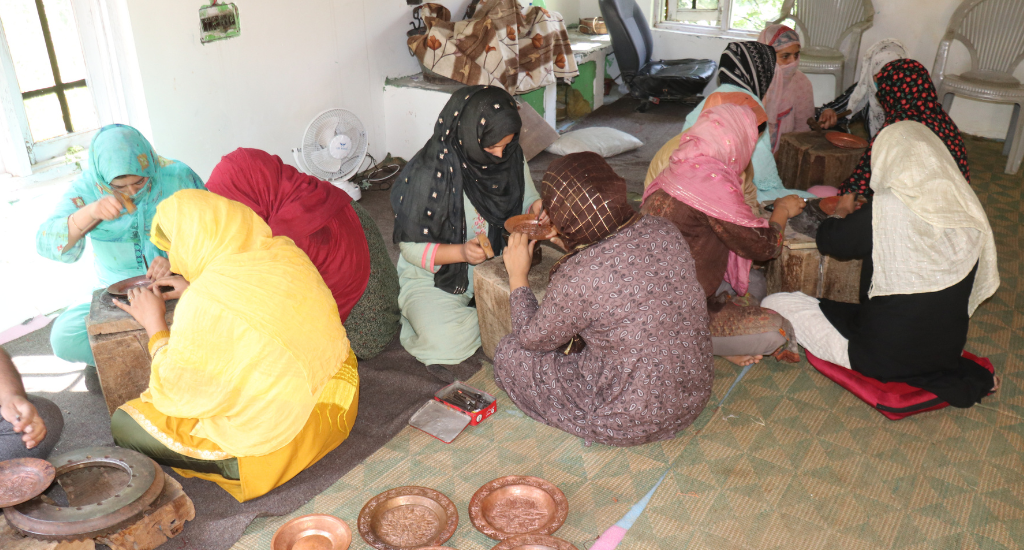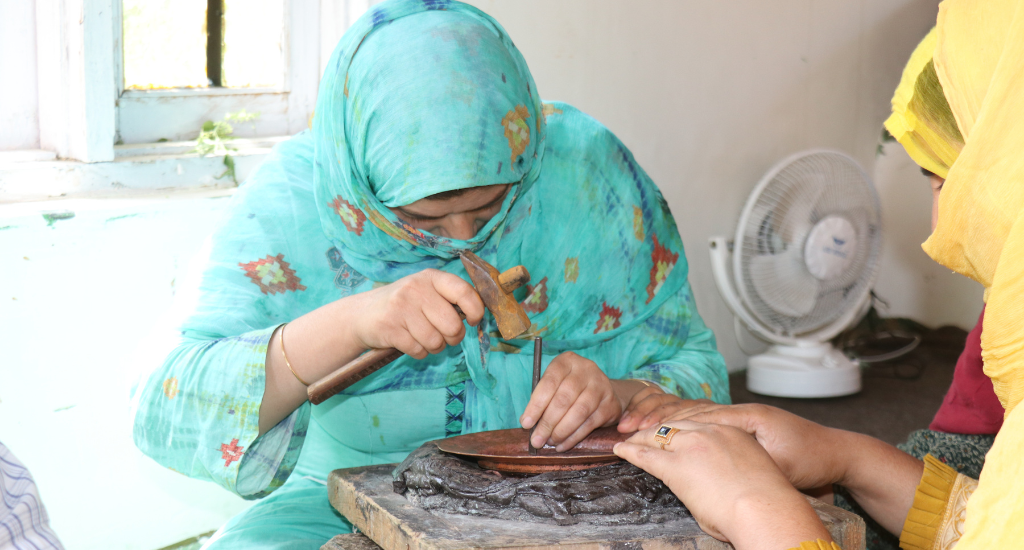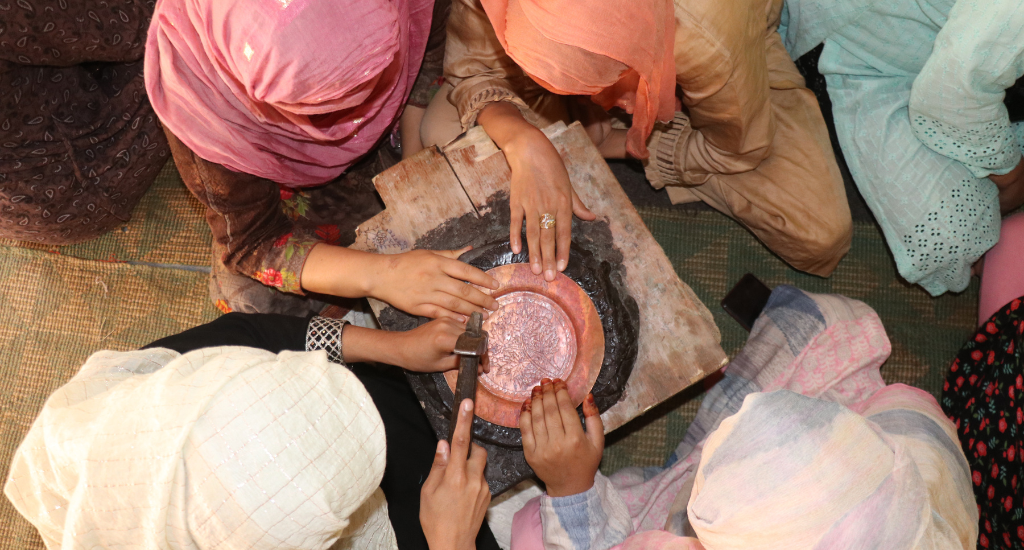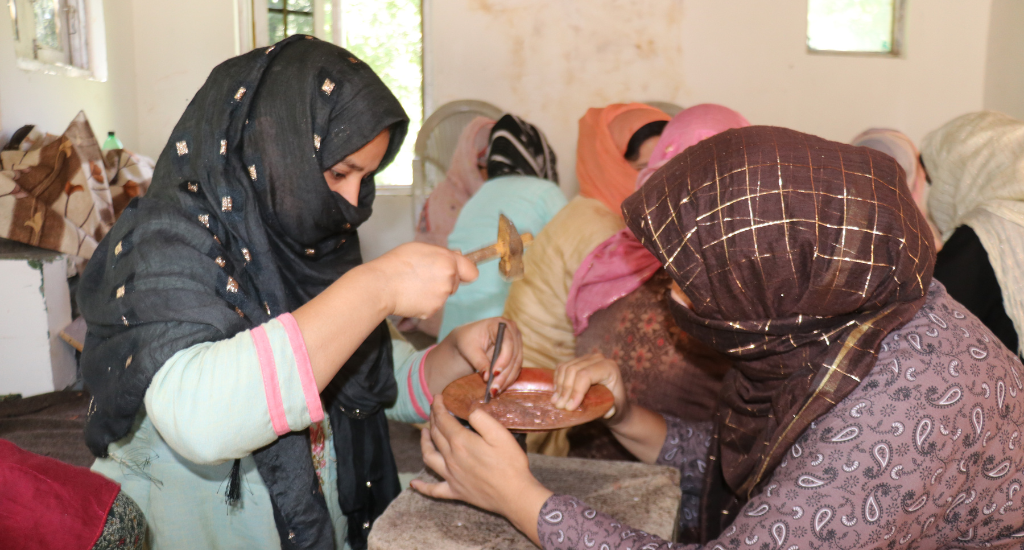
Copperware carves way for Kashmir women’s empowerment
Defying gender barriers, young women are training to be coppersmiths in Kashmir and working towards making their mark in a male-dominated craft sector to ensure social and financial empowerment.

Defying gender barriers, young women are training to be coppersmiths in Kashmir and working towards making their mark in a male-dominated craft sector to ensure social and financial empowerment.
Away from the crowd and the din of the commercial centre of Balpora Wathoora in Budgam district of Jammu and Kashmir, beyond a creaking wooden bridge and a lane lined with poplar trees, 16 girls are seated on the floor in a room, focused on engraving designs on copper utensils.
The smell of copper pervades the room in the village, which is located about 15 km from Budgam town, the district headquarters. The girls, who are in their twenties, are learning how to engrave designs on copper utensils. They are busy pursuing their dream of becoming coppersmiths.

Between hammering designs on round copper plates, they occasionally but furtively retrieve the phone out of their pocket and read messages with suppressed laughter beneath their veils. Soon they bury themselves back in engraving chinar leaf designs on copper plates as their instructor keeps a close vigil like a teacher on students in a classroom.
Braving occasional mocks from family and society over the choice of vocation, the young women are overcoming societal shackles, shattering gender stereotypes and norms by aspiring to become coppersmiths.
“Four of our fellow trainees have already quit after they got engaged to be married. They were not allowed to learn the skill due to the social stigma of foraying into a male-dominated field,” said Mymoona Amir, a trainee.
Also Read: Copperware losing sheen for Tamtas of Almora

Though Amir has completed her undergraduate degree, instead of working at some place far from home – which would also be frowned upon – she opted to skill herself near her home.
As finding stable employment is a struggle for women, especially in villages, the establishment of the training centre in May 2022, supported by the government’s Handicrafts and Handloom Department, has brought a ray of hope for many young women.
“We are pursuing a two-year training course under the instructor, Mukhtar Ahmad,” said Amir. “Though society mocked us for becoming thanthir koor (women coppersmiths), we didn’t lose courage and continued to learn the craft.”
As copperware comprises the main kitchen utensils used in Kashmir, the women see this craft as a viable livelihood option.
“This work is different, difficult and more taxing compared to other jobs like tailoring or embroidery, usually chosen by women since they can work in the confines of their home,” said Amir, as other trainees nodded in affirmation.

Initially, they found it difficult to comprehend how to work with copper but they gradually learned how to handle the various instruments used in shaping copper metal and engraving designs.
“It’s manual work. Unlike machine-driven jobs, it demands muscle power too. We even got bruised and hurt while learning how to use the tools,” said Amir.
The women specialise in engraving various designs, especially kandkari (geometrical motifs) which fetch good money in the market. The commonly used motifs are almond, maple leaf and arch.
The trainees are given a monthly stipend of Rs 1,000 by the government.
“For many of us, this amount means a lot. It is something we don’t have to ask for. It ensures our self-reliance and we see this as our first step towards financial independence and empowerment,” said Tahmeena Manzoor, one of the trainees.
Also Read: Students help revive traditional metal craft

Manzoor got interested in the craft as she grew up watching her father transform sheets of copper into pieces of art.
“Being a girl I was never allowed to dream to carry on my father’s legacy. When I came to know about this training centre, I couldn’t let my dream die,” said Manzoor.
Another trainee, Urbeena, a mother of three, comes to the centre after finishing the household chores.
“I managed to convince my husband, who works as a labourer, that I want to contribute to the growing demands of our household. We want to give our children the best education and I’m learning this craft to empower myself and my family,” she said.
Another trainee, who wished not to be named, said that her troubled marriage and return to her paternal home forced her to look for a dignified livelihood. She joined the training after learning about it through an acquaintance. “I had to find sustenance to survive after my marriage ended. It’s necessary to learn, earn and empower oneself,” she said.
After initial inhibitions, the young women’s families also supported their dreams as the centre is located near their houses.
The women want to explore and create market-friendly designs on different copper objects. However, all the steps require specialisation and different techniques, according to their instructor Mukhtar Ahmad, who was all praise for the women’s perseverance and the speed of learning despite obstacles.
“We don’t want to be limited by conventional business strategies. We intend to create a group and work on marketing our products and reach a wider market through the help of various government schemes and social media,” said Tahmeena Manzoor.
The centre also functions as a place of social sphere for women.
“It prevents us from facing mental health issues caused by idleness and staying within the confines of home. Here we learn, socialise and enjoy a camaraderie with each other,” they said.
Also Read: Brass smiths of Parev brave hardships to keep traditional craft alive
The lead image at the top shows young women training to be coppersmiths in Kashmir. (Photo by Khalid Bashir Gura)
Khalid Bashir Gura is an independent journalist based in Srinagar.